|
|
|
Sort Order |
|
|
|
Items / Page
|
|
|
|
|
|
|
| Srl | Item |
| 1 |
ID:
181673


|
|
|
|
|
| Summary/Abstract |
Bengali Dalit literature has been published for over a century but is yet to be appreciated by a larger mainstream readership. In this essay, I examine how the ‘absence’ of Bengali Dalit literature was constructed by several social, political and ideological factors that together obscured the cultural history of Bengali Dalits. Using literary texts—primarily autobiographies—written by Bengali Dalit authors as an entry point, this essay analyses the explicit and implicit mechanisms of Brahmanical oppression that have prevented Bengali Dalit writers from consolidating their distinct identity. Set against the critical debate regarding the subaltern’s (in)ability to speak and/or be heard, this essay records Bengali Dalit literature’s triumph over casteist endeavours to relegate it to the periphery.
|
|
|
|
|
|
|
|
|
|
|
|
|
|
|
|
| 2 |
ID:
098511


|
|
|
| 3 |
ID:
165137
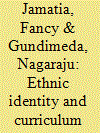

|
|
|
|
|
| Summary/Abstract |
The paper aims to understand the role of school textbooks and curriculum in shaping the majority and minority identity in Tripura. Though Tripura is a tribal majority state, the partition of the country led to the influx of Bengali Hindus. Based on the sociological analysis of history and language textbooks in Tripura schools, the paper argues that the state is systematically projecting the Bengali Hindu identity as ideal and marginalising the identity of diverse tribal groups. Dominant language, religion and cultural practices of the Bengalis were celebrated whereas the linguistic diversity and spiritual pathways of the subaltern communities are either ignored or mentioned peripherally. Since the inception of formal education in Tripura, the state failed to develop the tribal languages and script which led to the ideological submission of ethnic groups to the dominant identity. Thus, Tripura witnessed an ideological shift from the multiple identities to monolithic identity works on the principle of Banglanization of the state and civil society.
|
|
|
|
|
|
|
|
|
|
|
|
|
|
|
|
| 4 |
ID:
095400
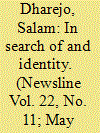

|
|
|
| 5 |
ID:
117601
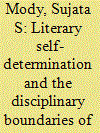

|
|
|
|
|
| Publication |
2012.
|
| Summary/Abstract |
This article examines Mahavir Prasad Dwivedi's project of literary self-determination, as articulated in two programmatic essays published in the Hindi journal Sarasvati under his editorship (1903-1920), scrutinising his construction of literature as a culturally embedded category of national consequence. His theorisation of Hindi literature as broadly inclusive in terms of its basic definition and function supported the growth of what he considered a national treasury of literature. His discussion of its historical and linguistic parameters and his emphasis on a prioritised plan of literary production, reified the notion of a modern discipline oriented towards a narrowly constructed national collective that sought to establish its sovereign identity via literature in Khari Boli Hindi. Though not explicit in its anti-colonial nationalism, this project nevertheless privileged Hindi as the projected lead language of a modern sovereign nation, with all the risks that delimitation entailed.
|
|
|
|
|
|
|
|
|
|
|
|
|
|
|
|
| 6 |
ID:
175481
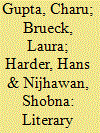

|
|
|
|
|
| Summary/Abstract |
This collection brings together nine essays, accompanied by nine short translations, that redraw the boundaries of literary histories both temporally and spatially. The essays, rooted in the humanities and informed by interdisciplinary area studies, explore multiple linkages between forms of print culture, linguistic identities and diverse vernacular literary spaces in colonial and post-colonial South Asia. The essays and translations foreground complex and politicised expressions of gender and genre in fictional and non-fictional print materials and thus draw meaningful connections between the vernacular and literature, the everyday and the marginals, and gender and sentiment. Collectively, they expand vernacular literary archives, canons and genealogies, and push us to theorise the nature of writing in South Asia.
|
|
|
|
|
|
|
|
|
|
|
|
|
|
|
|
| 7 |
ID:
177937
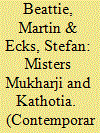

|
|
|
|
|
| Summary/Abstract |
This article reflects on the meanings of money in the lives of two very different people from Kolkata. Mr Mukharji, a 60 year-old Bengali man, was a branch manager of a state bank who devoted his life to Tantrik Yoga. Mr. Kathotia, a Marwari man, was a wholesale paper dealer, with an interest in stamp and coin collecting. After first developing a theoretical framework on the sociology of money, the authors go on to describe their encounters with these two people, their different ethnic belongings, their social and working lives and what matters to them in life.
|
|
|
|
|
|
|
|
|
|
|
|
|
|
|
|
| 8 |
ID:
141664
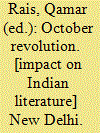

|
|
|
|
|
| Publication |
New Delhi, Sterling Publishers Pvt Ltd, 1978.
|
| Description |
xiii, 136p.pbk
|
|
|
|
|
|
|
|
|
|
|
|
Copies: C:1/I:0,R:0,Q:0
Circulation
| Accession# | Call# | Current Location | Status | Policy | Location |
| 017424 | 947.0841/RAI 017424 | Main | On Shelf | General | |
|
|
|
|
| 9 |
ID:
179987
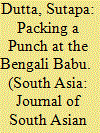

|
|
|
|
|
| Summary/Abstract |
The emergence of the bhadralok in the nineteenth century, typified by ‘genteel’ qualities and Western education, reflected changes in the nature of Bengali identity and subjectivity. The colonial experience resulted in an anxiety among elite Bengalis to define a social class for themselves that would delineate their gentility and shape a new code of ‘acceptability’. The ‘Babu’ came to be associated with this new class of Bengalis eager to adopt Western manners and learning who formed the greater part of the white-collar workers required in the cosmopolitan enclave of Calcutta. They were satirised, particularly in colonial discourse, for their imitation of English manners, attire and language. This article explores the shifting markers of gentility and the satiric representation of the Bengali Babu (and his Bibi) in the British satirical magazine, Punch, and its contemporary vernacular counterparts in colonial Bengal.
|
|
|
|
|
|
|
|
|
|
|
|
|
|
|
|
| 10 |
ID:
131770
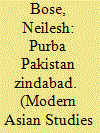

|
|
|
|
|
| Publication |
2014.
|
| Summary/Abstract |
This paper details the history of the concept of Pakistan as debated by Bengali intellectuals and literary critics from 1940-1947. Historians of late colonial South Asia and analysts of Pakistan have focused on the Punjab along with colonial Indian 'Muslim minority' provinces and their spokesmen like Muhammed Ali Jinnah, to the exclusion of the cultural and intellectual aspects of Bengali conceptions of the Pakistan idea. When Bengal has come into focus, the spotlight has centred on politicians like Fazlul Huq or Hassan Shahid Suhrawardy. This paper aims to provide a corrective to this lacuna by analyzing Bengali Muslim conceptualizations of the idea of Pakistan. Bengali Muslim thinkers, such as Abul Mansur Ahmed, Abul Kalam Shamsuddin, and Farrukh Ahmed, blended concepts of Pakistan inside locally grounded histories of the Bengali language and literature and worked within disciplines of geography and political economy. Many Bengali Muslim writers from 1940 to 1947 creatively integrated concepts of Pakistan in poetry, updating an older Bengali literary tradition begun in earlier generations. Through a discussion of the social history of its emergence along with the role of geography, political thought, and poetry, this paper discusses the significance of 'Pak-Bangla' cultural nationalism within late colonial South Asian history.
|
|
|
|
|
|
|
|
|
|
|
|
|
|
|
|
|
|
|
|
|